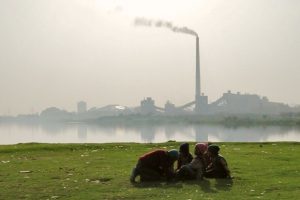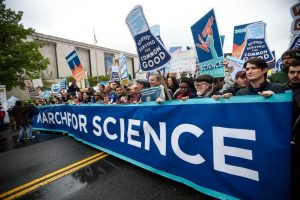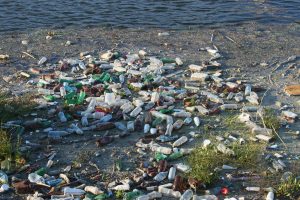The view from my hotel window was something out of a science fiction tale. A shroud of thick haze hung over New Delhi, blanketing India’s capital city and its more than 21 million people, and close to 8 million children, in a toxic brew of fumes. The situation was so bad that United Airlines cancelled all its flights into the city. Trains, a major form of transportation in India for people across all social categories, were delayed or cancelled as well. Local media reported that visibility was so poor that it caused major pileups on highways throughout the area. The parallels with conditions in some US cities 50 years ago are astounding and led to the original Earth Day protests in 1970.
And that was just the impact on transportation in New Delhi, which has now earned the unenviable title of “Most Polluted City in the World.” The truly horrifying aspect of this pollution emergency was its impact on the health of every resident in this vast urban landscape. Hospitals in the region reported spikes in pollution-related admissions, and a health emergency was declared. The air was, for all intents and purposes, poison.

IN THE PHOTO: Smog is overwhelming some cities in India, making it harder to breathe, especially for the young and elderly.
In more scientific terms, the Air Quality Index in New Delhi reached an astounding 999 reading at some monitoring stations, while the U.S. Embassy recorded a mind-boggling 1010. In normal times the AQI scale runs from zero to 500, with an AQI measurement of anything over 300 being considered as hazardous to human health. The simplest way public health officials could describe this level of air pollution was to compare breathing the air in New Delhi to smoking two and a half packs of cigarettes per day.
I can’t think of a clearer example of the connection between environmental concerns and human health and development. If the world has any hope of achieving the UN’s Sustainable Development Goals (SDGs), then we simply have to make environmental protection a priority for everyone. The threats we have created for ourselves are existential. Pollution, climate change, deforestation and the loss of biodiversity are literally making us sick, and in the long-term are threatening the existence of humankind.
The SDGs recognize the importance of environmental protection in both explicit and implicit ways. The most obvious example is the SDG for climate action, which recognizes that “further global warming is causing long-lasting changes to our climate system, which threatens irreversible consequences if we do not take action now.” However, environmental issues and concerns are an equally critical part of many of the other SDGs, including those for good health and wellbeing, clean water and sanitation, and sustainable cities and communities.
Those goals can’t be achieved without active citizen participation. People must work together to demand the necessary changes in policies and practices from governments and corporations to defend the environment. We need everyone to act now, before it’s too late.
That may sound like a tall order, but it has happened before. On the first Earth Day, on April 22, 1970, millions of people took to the streets in the U.S. to protest the negative impacts of 150 years of industrial development.

IN THE PHOTO: In 1970 New York, protestors took over city streets for Earth Day.
In the US and around the world, smog was becoming deadly and evidence was growing that pollution led to developmental delays in children. Biodiversity was in decline as a result of the heavy use of pesticides and other pollutants. Global ecological awareness was growing, and the US Congress and President Nixon responded quickly. In July of the same year, they created the Environmental Protection Agency, and robust environmental laws such as the Clear Water Act and the Endangered Species Act, among many others.
My organization, Earth Day Network, was born out of that first Earth Day. Earth Day is now a global event. It has grown each year with more than 1 billion people in 192 countries taking part in what is easily the largest day of civic action in the world.
Earth Day is all about political action and civic participation. People march, sign petitions, meet with their elected officials, plant trees, clean up their towns and roads. Corporations and governments use it to make pledges and announce sustainability measures. Faith leaders, including Pope Francis, connect Earth Day with protecting God’s greatest creations, humans, biodiversity and the planet that we all live on.
This past April, on Earth Day 2017, we were proud to organize and lead the March for Science in Washington, DC with satellite marches in over 600 cities around the world. We reached millions of people and demonstrated to government and corporate leaders around the world public support for climate action, and real, science-based environmental laws and policies.

IN THE PHOTO: On Earth Day 2017, April 22 the March for Science took place in Washington.
As this era’s environmental challenges continue to mount, and governments continue to drag their feet, or worse, backslide on environmental protections, we are using the time between now and the 50th anniversary of Earth Day in 2020 to rally people around a series of global campaigns. Earth Day Network works year-round and some of our major programs include:
- Working to end plastic pollution by change practices at the local and national levels, and building support for global laws and regulations;
- Promoting universal climate and environmental literacy through laws, regulations and programs so that every child can be prepared for the 21st century;
- Planting 7.8 billion trees by 2020, one for every man, woman and child on the planet; and
- Working with rural women leaders in India to promote solar lighting.
- Each of these campaigns is helping to achieve multiple SDGs and contributes to the UN’s bold vision for a healthier, happier planet.
Earth Day Network’s Canopy Project works worldwide to strengthen communities through tree planting. Using agroforestry, sampling distribution and tree care training, we empower organizations and citizens to conserve, repair and restore tree cover to their lands. Our campaign targets areas of the world most in need of reforestation, including some of the world’s poorest communities; and land degraded by logging, fires, floods, hurricanes and earthquakes. Our projects also focus on environmentally critical areas such the Amazon rainforest and the Boreal Forest.

IN THE PHOTO: Earth Day Network wants to plant 7.6 billion trees, one for each person on Earth.
Trees provide food, energy and income, helping communities achieve long-term economic and environmental sustainability. Trees also filter the air and help reverse the impacts of climate change. In just one season, a mature leafy tree produces as much oxygen as 10 people inhale in a year.
The positive effects of our reforestation efforts support the SDGs both directly indirectly. Our tree planting campaign clearly advances the goal for “life on land,” which specifically calls for the protection and restoration of terrestrial ecosystems. But our reforestation work also promotes the goal for climate action by helping maintain and increase forest-based carbon sequestration. Likewise, our work in more urban areas contributes to achieving the goal for sustainable cities and communities. Trees also help take other pollutants out of the air and are part of the solution for the SDG on good health and wellbeing. Not a bad contribution for something that also provides invaluable habitat for many other species and brings beauty to the world around us as well.
Our latest campaign focuses on ending plastic pollution. Why plastic? Plastic pollution is a real and growing threat to our planet that rivals climate change. From injuring marine life to disrupting human hormones, plastic pollution is having a devastating impact. Plastic pollution is not just an environmental crisis, but also is one of the most urgent public health, human rights and social justice issues of our day. The worst impacts of plastic pollution often affect the poorest communities around the world.
The good news is we can solve this problem. Citizens can play an activist role in demanding action to end plastic pollution. That’s why we’re working on educating and mobilizing citizens, and influencing governments and corporations to achieve large-scale reductions in plastic pollution around the world. We’re engaging business leaders willing to commit to reduce or eliminate plastic, and building support for global rules to prevent and manage plastic pollution. Our intention is to have Earth Day 2018 mark the first step toward the ultimate goal of replacing fossil fuel-based plastics with nonpolluting materials.

IN THE PHOTO: Plastics pollution is widespread, from a giant mass floating mid-Pacific, to litter in major cities.
Again, the connections with the SDGs are clear. Eliminating plastic pollution will aid in the life below water goal, protecting marine life from a major hazard. It will support clean water and sanitation goals, by acting on one of the major waste products that contaminate both urban and rural areas. It will help reduce our ecological footprint as required under the goal on responsible consumption and production. And, as with our reforestation efforts, it will contribute to the overall goals for good health and wellbeing.
Our third major campaign is focused on achieving universal environmental and climate literacy. Climate literacy is a basic human right. It is the engine for individual behaviour change, the clean energy revolution and the jobs that come with it, and the policy reforms needed at all levels of government.
Recognizing the importance of an educated global population, the authors of the Paris Climate Agreement put climate education at the heart of the Agreement, calling on national governments to cooperate in taking measures to enhance climate education, training and access to information. The 2016 UNESCO Global Education Monitoring Report “Education for People and the Planet: Creating Sustainable Futures for All” highlighted the urgent need to focus countries’ attention on climate education.

IN THE PHOTO: Deforestation is a major problem that contributes to climate change.
Different models for formal and informal climate education are sprouting around the globe. Some countries internalized the values of climate and environmental education years ago, recognizing that the jobs of the future belong to those who understand not just information about the environment but also the potential for economic growth. Finland, for example, already recognized for its top educational system has been teaching environmental education and climate risks and opportunities for more than a decade. At the same time, climate and environmental education faces an increasingly uphill battle in the U.S.
To assist policymakers worldwide in evaluating and improving their education and economic systems, EDN is undertaking a global study on the state of the art of global environmental and climate literacy. We’re continuing our longstanding education efforts in the United States, and are well on our way towards our goal of providing 10 million Indian youth and Panchayat women leaders, rural women and girls about the environment and sustainable development.
Environmental education and climate literacy may be the most powerful tool we have to support the SDGs. We have seen time and time again that meaningful change is possible when citizens understand environmental issues and work together to demand their rights to a cleaner, safer, healthier planet.
The world has come a long way since the first Earth Day in 1970, but the new challenges we face today are even greater. Global citizens need to join together to bring about change now, just as they did almost 50 years ago. The hour is late, but there is still time to mend and heal the planet, and to achieve the vision for humanity laid out in the SDGs.
Editors note: The opinions expressed here by Impakter.com columnists are their own, not those of Impakter.com










